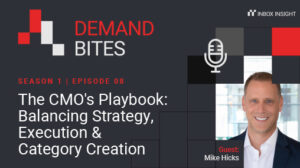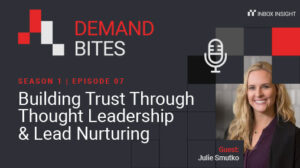The B2B purchasing landscape is increasingly complex, with multiple decision-makers, expanding product options, and rapidly evolving technology. In this environment, trust becomes essential – guiding buyers through uncertainty and influencing their decisions. Buyers often seek third-party validation to provide external credibility and reassure them that a brand’s solutions are reliable.
Partnering with industry experts offers B2B brands a powerful way to meet this need for trust and validation. These partnerships go beyond marketing – they serve as proof points that reinforce expertise and build buyer confidence. It’s no coincidence that 75% of decision-makers trust brands that collaborate with industry experts and influencers.
This article explores how expert partnerships can strengthen trust, enhance brand authority, and drive success in the competitive world of B2B sales and marketing.
Why is trust so critical in B2B purchasing?
B2B purchases are high-stakes, long-term commitments requiring significant investment. Buyers need confidence that their chosen solution will deliver value, often seeking assurance from vendors and credible industry sources.
Providing valuable content is one way to earn that trust – 88% of B2B buyers trust brands that offer insightful, educational materials to support their decision-making. However, access to trustworthy information remains a challenge, with 41% of buyers struggling to find reliable details about technology solutions.
In a competitive marketplace, trust can be the deciding factor in winning and retaining business. Without it, sales cycles can stretch, and buyers may turn to more credible vendors. Brands that prioritize transparency, valuable content, and third-party validation are better positioned to earn buyer confidence and drive long-term success..
Building brand credibility through expert partnerships
In an era where buyers actively seek impartial perspectives, third-party insights are more influential than ever – 44% of B2B buyers prefer content from external sources over vendor-provided materials. This demand for independent validation makes expert partnerships a powerful strategy for enhancing credibility and trust.
Aligning with recognized authorities strengthens a brand’s positioning, with 75% of decision-makers placing greater trust in brands affiliated with industry experts. These collaborations not only reassure buyers but also shape their perceptions, providing a competitive edge in the decision-making process.
Different types of experts offer distinct advantages:
- Analysts & consultants: Industry research firms like Gartner and Forrester provide authoritative insights. A mention in a Gartner Magic Quadrant, for example, signals market leadership and reliability.
- Practitioners & executives: First-hand perspectives from C-suite leaders and department heads demonstrate how a solution addresses real-world challenges.
- Influencer content creators: Trusted LinkedIn voices and YouTube experts can expand reach, reinforce credibility, and amplify a brand’s message.
By leveraging expert perspectives, brands can add depth to their narratives and create more compelling and trustworthy content that resonates with buyers. These endorsements serve as a testament to a brand’s expertise, reinforcing confidence at critical points in the purchasing journey.
How B2B buyers consume expert-led content
B2B buyers engage with a range of channels and content formats throughout their purchasing journey, making it essential for brands to align their engagement strategies with buyer preferences. A key part of this process is understanding where buyers turn for information and how they interact with expert-led content.
For many buyers, the research phase begins with software comparison websites and industry news platforms, which provide objective evaluations and up-to-date market insights. More than half of B2B buyers rely on these sources to assess potential solutions, using them as a foundation for informed decision-making.
Professional networks also play a crucial role, with LinkedIn serving as a go-to platform for work-related content. In fact, 74% of buyers use LinkedIn to consume industry insights, connect with thought leaders, and participate in discussions that shape their purchasing decisions. Brands that actively share content and engage with their audience on LinkedIn can strengthen their credibility and visibility.
As buyers move closer to a decision, direct engagement with subject matter experts becomes increasingly important. A significant 72% expect one-on-one consultations with vendors, seeking tailored advice that addresses their specific challenges. These interactions provide an opportunity for brands to demonstrate expertise and build trust through personalized guidance.
Thought leadership content further supports the evaluation process, with 45% of buyers looking for whitepapers, research reports, and expert analysis when assessing a vendor’s credibility. High-quality, data-driven content helps buyers gain deeper insights into industry trends and reinforces a brand’s authority.
Interactive formats also influence engagement, with 40% of buyers preferring webinars over podcasts. The ability to participate in live Q&A sessions makes webinars particularly valuable, allowing buyers to engage directly with experts and gain real-time insights that shape their purchasing decisions.
Leveraging expert partnerships for B2B brands
To fully capitalize on expert partnerships, B2B brands must focus on both creating high-value content and ensuring its effective distribution. A strategic approach ensures that expert-led insights not only establish credibility but also reach buyers at critical points in their journey.
Creating high-value expert content
The foundation of a successful partnership lies in producing authoritative, insightful content that resonates with buyers. Brands can collaborate with experts to develop:
- Research-backed reports and whitepapers: Partnering with analysts to produce data-driven reports positions a brand as a thought leader and provides buyers with reliable industry insights.
- Webinars and panel discussions: Live events featuring experts offer deep dives into key topics while allowing for real-time engagement through Q&A sessions.
- Guest blog collaborations: Inviting industry professionals to contribute content adds credibility and introduces fresh perspectives to the brand’s messaging.
- Video interviews and podcasts: Conversations with practitioners sharing real-world experiences make content more engaging and actionable for buyers.
Amplifying expert content across channels
Once created, expert-driven content must be strategically distributed to maximize its impact and reach:
- Repurpose insights across platforms: Adapting content for LinkedIn, YouTube, newsletters, and paid campaigns ensures it reaches buyers where they are most active.
- Integrate expert insights into sales materials: Incorporating authoritative statements and data points into sales presentations and brochures reinforces credibility during the decision-making process.
- Sponsor analyst research: Engaging in partnerships where analysts feature the brand in industry reports further enhances its reputation and authority.
By combining expert-led content creation with a targeted distribution strategy, B2B brands can strengthen their position as trusted industry voices and build deeper connections with potential buyers.
Measuring the impact of expert-led demand generation
To evaluate the effectiveness of expert-led initiatives, B2B brands must track key performance indicators (KPIs) that reflect brand credibility, engagement, and revenue impact. By analyzing both quantitative metrics and qualitative feedback, brands can refine their approach and maximize results.
Tracking key performance indicators
Expert-led initiatives should be assessed based on their influence on buyer behavior and business outcomes:
- Brand trust and recognition: With over 85% of buyers shortlisting vendors they recognize, measuring brand awareness through surveys and studies helps gauge the impact of expert partnerships.
- Engagement with thought leadership content: Metrics such as page views, time spent on content, and social shares indicate how well expert-driven materials resonate with the audience.
- Conversion rates from expert-led campaigns: Comparing lead-to-customer conversion rates from expert collaborations against other channels reveals their effectiveness in driving qualified leads.
- Impact on sales pipeline and revenue: Analyzing how expert-led initiatives contribute to faster sales cycles and revenue growth demonstrates their role in accelerating the buyer’s journey.
Gathering qualitative insights
Beyond numerical data, direct buyer feedback provides a deeper understanding of how expert partnerships shape purchasing decisions. Conducting interviews, collecting testimonials, and analyzing buyer sentiment can uncover valuable insights that refine content strategies and strengthen brand positioning.
By combining data-driven analysis with buyer perspectives, B2B brands can continuously optimize their expert-led demand generation efforts, ensuring sustained impact and long-term success.
The future of expert partnerships in B2B marketing
Collaborating with industry experts is a powerful way for B2B brands to build trust, strengthen credibility, and enhance demand generation. Expert-led content not only resonates with buyers but also supports them throughout their decision-making journey with authoritative insights.
As the B2B landscape continues to evolve, brands that prioritize expert partnerships will be better positioned to meet buyer expectations, stay competitive, and adapt to industry shifts. By embedding industry expertise into their demand generation strategies, companies can navigate market complexities, foster lasting client relationships, and drive sustainable business growth.
Build Trust with Authoritative Insights: Access the Full B2B Tech Buying Behavior Report Now.






